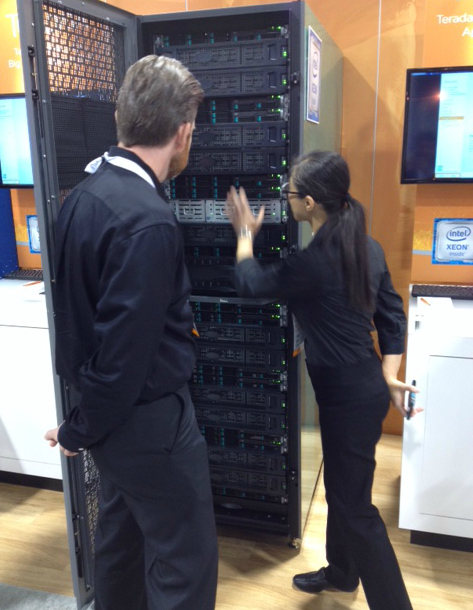How a major vendor cut the hardware cord to move to cloud, or anywhere else for that matter


These days, while Teradata still sells boxes, its data warehousing product line is all software, which is being lifted and shifted to new commodity and cloud settings, including Amazon Web Services. The change to software-defined product is illustrative of what is happening across the industry.
I recently had the opportunity to sit down with Oliver Ratzberger, president of Teradata Labs, to discuss the ramifications of this major shift for the vendor. (Disclosure: I was an invited guest to the recent Teradata Partners conference, which assisted with my travel expenses.)
Teradata announced in October that it is making its data warehouse available for cloud deployment on AWS to support production workloads. The initial version of Teradata Database on AWS, to be launched Q1 2016, will be offered on a variety of individual multi-terabyte virtual servers--known as Amazon Elastic Cloud Compute (EC2) instances.Essentially, "one click to porvision a Teradata box," Ratzberger states.
Teradata already has been offering cloud-based data warehousing from its own service for the past two years. Cloud-based data warehousing is one of the fastest-growing segments of Teradata's business ("triple-digit" growth I am told). Which begs the question: is it possible Teradata will be mostly a cloud-delivered service in a few short years? Ratzberger says it's a possibility, but many enterprise customers still prefer on-site systems or appliances. He adds, however, that the Teradata offering via AWS, or Teradata's own cloud for that matter, will be exactly the same. "We have been rolling out on Amazon is the same code base as we run on the optimized hardware," he says.
So how was this lift and shift to the cloud made possible? Over the past year or so, Teradata Database has become completely software-based. That means the code will run just as handily on a Linux server cluster as it does on the vendor's own native boxes -- or on a cloud platform. Accordingly, along with AWS slated for Q1, Teradata plans to deploy its software on Microsoft's Azure platform, followed by Google Compute Engine.
"Today, Teradata is 100% software," Ratzberger explains. "What you see down there -- when you open up a [Teradata system rack], is Dell servers or Intel processors, with Dell or EMC storage." Until recently, Teradata only ran on proprietary hardware, supporting Unix.
The last connection between the software and underlying hardware was the BYNET switches, which were severed and converted to software about two years ago, Ratzberger says. Small systems now interconnect with underlying hardware via InfiniBand, or 10 GB Ethernet in the case of larger systems, he adds. This is likely to get boosted to 100 GB within the next 12-18 months as the standards evolve.
There is one critical difference between using Teradata instances in AWS versus Teradata Cloud direct, Ratzberger points out. "Since Teradata Cloud is considered to be private cloud, we do everything through VPN connections. You wouldn't have access through the regular internet. You would only be able to tunnel through your VPN." In contrast, he says, AWS instances are accessible through standard internet connections.
Whichever way it is accessed, demand for cloud-based data warehousing is growing rapidly, and getting more sophisticated. There are now customers looking at 20 nodes or more in the cloud, which gets really serious," Ratzberger says. At the recent Amazon Re-invent conference, Capital One announced that it was going entirely to the cloud, which includes its Teradata system. In addition, Ratzberger relayed, "the CEO of LiveNation announced that within 18 months they want to shut down all of their data centers, and migrate all to cloud, including Teradata Cloud."
Still, he adds, there are a number of large enterprises that still see advantage in buying large sets of commodity servers at discounts, which is a savings from cloud subscriptions.
For Teradata, the shift to cloud means many more small to medium-size businesses that never had the budgets for data warehousing.